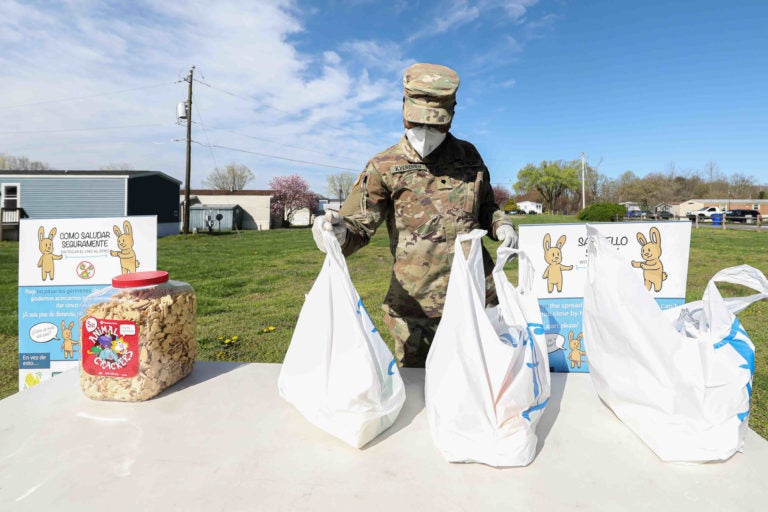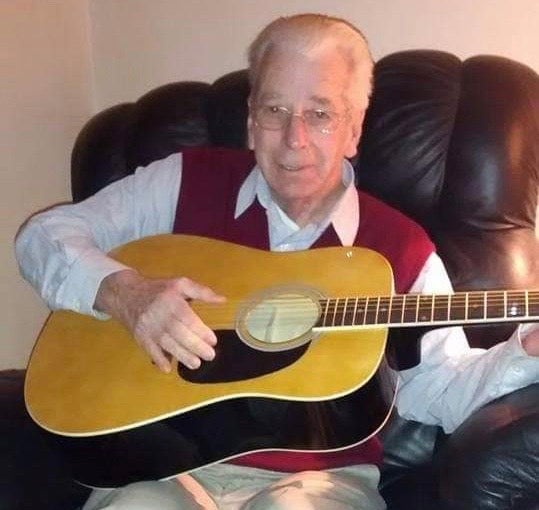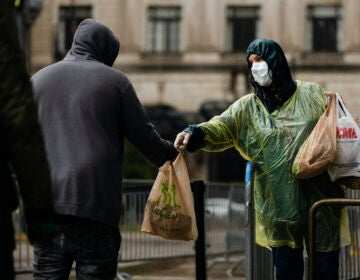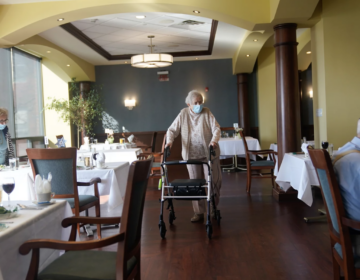Coronavirus update: Fewer hospitalized in Delaware as number of new cases is lowest in 10 days
Through Wednesday, more than half of the Delawareans who died lived in nursing homes. WHYY found that residents comprise 5% of the state’s cases.

Delaware National Guard Private Kyeremen sets up a station for packaged food pick-up on Wednesday, April 8, 2020, at Frederick Lodge Manufactured Home Community in Townsend, Del. (Saquan Stimpson for WHYY)
Are you on the front lines of the coronavirus? Help us report on the pandemic.
Updated 5:47 p.m.
Delaware cases surpassed 2,000 Wednesday but the number of new ones in the last 24 hours was lower than each of the previous 10 days and fewer people were hospitalized.
In all, there were 88 new cases reported Wednesday afternoon by the state Division of Public Health, raising the total to 2,014. There have been 46 deaths, including three in the last day.
But two signs pointed to the “flattening of the curve’’ that Gov. John Carney keeps stressing is so vital to his and other states.
The tally of new positive test results was the least in any 24-hour period since April 5. In addition, there are now 208 people hospitalized, compared with 217 late Tuesday.
Nursing home rules tightened
With nursing homes in Delaware reeling from the coronavirus crisis, Gov. John Carney tightened regulations Wednesday while modifying his month-old State of Emergency declaration.
Carney’s latest move to combat the spread of the virus in his state requires all nursing and other long-term care facilities to immediately:
- Establish a cohort of staff who are assigned to care for residents known or suspected to have COVID-19, and designated a room, unit, or floor for them.
- Designate a room, unit, or floor as a separate observation area where newly admitted and re-admitted residents are kept for 14 days. They must be observed every shift for signs and symptoms such as fever, cough or shortness of breath.
Carney’s updated order comes after Tuesday’s WHYY report on the disproportionate impact of the virus on Delaware’s nursing homes. To date, 24 of the 43 Delawareans — 56% — reported to have died from coronavirus were nursing home residents.
The fatalities include those who tested positive but also those who were considered “probable” COVID-19 patients because they had symptoms as well as contact with someone who tested positive.
WHYY found that nursing home residents account for 5% of Delaware’s COVID-19 cases but comprise far fewer than 1% of the state’s residents. Dozens of nursing home employees also have tested positive.
Through Wednesday morning, Delaware had 1,926 laboratory-confirmed cases. A total of 217 people are currently hospitalized in Delaware, including some out-of-state residents, and 45 are in critical condition.
Nursing homes called ‘petri dishes’ for disease
The governor’s latest order pertains not only to skilled nursing facilities but to assisted living, intermediate care for people with intellectual disabilities, home health care and personal assistance service agencies.
All facilities are being ordered to check the state’s guidance at least daily to and adjust their policies, procedures, and protocols as needed.
“Our elderly populations, and especially Delawareans in long-term care facilities, are at very high risk for COVID-19 infection and hospitalization. These stricter measures that we’re issuing today are intended to save lives,” Carney said in a news release.
Terri Hansen, whose father Charlie Secrest died from the virus on April 6 at the Brandywine Nursing & Rehabilitation Center in Prices Corner, urged the governor to go even further.
She told WHYY that nursing homes are “petri dishes” for disease and wants him to keep returning or new residents “alone” in an isolation room for 14 days. “Any kind of grouping runs the risk of spread,’’ she said.

- Charlie Secrest, pictured about six years ago, died at a Delaware nursing home on April 6 after contracting coronavirus. (Courtesy of Terri Hansen)
Hansen also wants Carney to require long-term care facilities to disclose details such as how many residents have tested positive; how many are symptomatic and how many have died; how they are handling positive vs. symptomatic patients and how they are protecting the health of residents who don’t have symptoms.
Since his March 12 emergency declaration, Carney has also issued a stay-at-home order for all but employees in essential jobs and people performing tasks such as shopping for food and other necessities, getting medicine, going or taking others to medical appointments and exercising.
He’s closed Delaware’s beaches and is requiring a mandatory 14-day quarantine for non-residents who enter Delaware, except for those passing through on the way to somewhere else.
Residents can get more information on the state’s coronavirus website.
“All Delawareans should do their part to protect their neighbors, friends, and family members – especially those who are immunocompromised,’’ Carney said Wednesday.
“We know the weather is getting nicer. But continue to stay at home. Don’t go out in public unnecessarily. You’ll only increase the risk for everyone. We’ll get through this. But we need to keep working together.”
WHYY is your source for fact-based, in-depth journalism and information. As a nonprofit organization, we rely on financial support from readers like you. Please give today.





![CoronavirusPandemic_1024x512[1]](https://whyy.org/wp-content/uploads/2020/03/CoronavirusPandemic_1024x5121-300x150.jpg)

